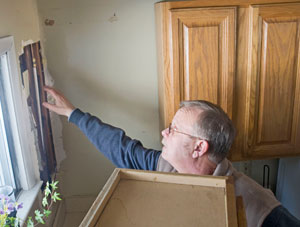
February 21, 2015
Deep freeze puts bite on pipes

Joe McIntyre/staff photographer
Plumbing and heating specialist Ron Van Dee points out a mended water pipe in an outside wall cavity Friday at a Cortland house.
Local officials and plumbers say the cold is affecting their operations and they are dealing with the problems it creates.
Plumbers say they are seeing an increase in calls following the bitter cold that has gripped the area in recent days. Temperatures in the next five days are expected to remain cold, with highs below freezing and lows ranging from 20 tonight to negative 9 degrees Monday night, according to the National Weather Service.
Ron Van Dee, owner of Ron Van Dee’s Plumbing and Heating on Taylor Street in Cortland, said he has dealt with dozens of calls for frozen water pipes in the past few weeks.
“Doesn’t look any better for the next week and a half,” he said, noting the temperatures are predicted to remain low.
A lot of the cases he encounters involve water pipes that are not well insulated and exposed to the wind, causing the pipes to freeze, Van Dee said.
He suggested that homeowners keep their faucets on at a steady trickle until the temperatures rise above 20 degrees so that the pipes do not freeze. They also should keep their thermostats at 68 to 70 degrees. It also can help to keep cabinet doors for sinks open so the pipes can get warmer air, especially if the pipes are near an outside wall, Van Dee said.
Even these efforts can fail sometimes, however, Van Dee said.
“Sometimes the wind blows just right, and there’s nothing they (the homeowner) can do about it,” he said.
In that case, it is better to use a hair dryer or to call a professional instead of turning to methods like a torch to heat up the pipes, Van Dee said, adding he has seen homes burn down because someone started a fire by heating pipes with a torch.
Local government officials say the cold temperatures are damaging their water systems.
Chris Bistocchi, city superintendent for public works, said there have been three water mains breaks in three weeks.
The first two occurred Feb. 2 on Jefferson Avenue and Feb. 6 on Kellogg Road. A third water main break occurred Tuesday at the intersection of Greenbush and Clinton streets.
As frost sinks deeper into the ground, parts of the ground freeze and thaw, stressing the pipes and sometimes causing them to break, he said.
“It definitely wreaks havoc with the water mains,” Bistocchi said, adding there is nothing city employees can do except to keep checking the water mains each morning and wait to see if another breaks.
When one of his crews replaced the water main on Feb. 6, they dug 32 inches into the ground to go below the frost line, but the temperatures have grown so cold even pipes that deep could now be exposed to freezing, he said.
Bistocchi said he estimates the city will have to deal with one or two more cases of broken water mains before the end of February as the cold weather continues.
Local fire chiefs say the cold weather has not affected their operations but add they are taking measures to keep things that way.
Willet Assistant Fire Chief Alvin Doty Jr. said the department did not have to worry about its water supply freezing up at a barn fire at 1325 Lower Cincinnatus Road Monday as it was near a water source, meaning it could keep the water flowing to the fire instead of being transported in tankers. The department took preventative measures because of the cold, keeping its pumps and hose lines running so the water did not freeze and rotating firefighters to keep them from getting too tired or cold from working in the snow, he said. Officials also tried to keep their firefighters away from the spray of the nozzles as much as possible so they would not get wet, Doty said.
City Deputy Chief Wayne Friedman said the department has modified its response to emergency medical calls by sending smaller vehicles instead of the larger engines when possible. That way, there is less chance water will freeze in a truck’s pipes and pumps, he said.
If an engine does go to a call, such as a fire alarm, the department tries to get the truck back to the station as quickly as possible to keep the water from freezing, Friedman said.
Cortlandville Fire Chief Jared Gebel said his department also is more conscious of its use of larger trucks in the cold weather, adding firefighters circulate the water through the vehicles while they are at car accidents so the liquid does not freeze.
Both Friedman and Gebel said their departments have not handled a lot of issues from pipes freezing and leaking so far. They added the number of such incidents could go up once the weather warms up and frozen pipes begin to thaw, however.
“That’s part of being here in Central New York,” Friedman said. “You risk that at some point.”
To read this article and more, pick up today's Cortland Standard
Click here to subscribe